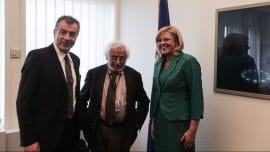Mr. Theodorakis said: "We believed that the country would change direction, but it looks like we are back in January. The Greek people decided the continuation of the old government". The leader of Potami clarified that “we will not participate in the government, given that we will not have the power to define developments”. When asked to comment on the role that Potami will be assuming in Parliament, he said: “our vote in Parliament will not be defined by narrow mindedness or hard feelings. It will always be on the basis of what we think is the common good and in the best interests of most of the Greek people”. Finally, he expressed the hope that Potami will be just as useful with the 4%.
Commenting on the electoral results, the leader of Potami Stavros Theodorakis stated that “Potami missed its target by far”.
This is his entire statement:
We believed that the country would change direction,, but it looks like we are back in January. The Greek people decided the continuation of the old government". Potami missed its target by far, and this generates questions regarding the mistakes that were made. It raises the question of who is responsible for the mistakes, and the answer is its leader. What we will decide will be determined within the next few days. As for the most important issue that concerns the Greek people - the direction of the country - we cannot be optimistic with this electoral result. Of course, we will be present in the opposition to point out the logical and progressive solutions that this country needs. With the 6%, we fought a battle that, to a large extent, determined the continued presence of the country in Europe. We hope that we will be just as useful with the 4% that the Greek people gave us. It must not pass unnoticed that one out of two Greeks did not even vote in these elections, and this is something that must concern the entire political system.
What do you mean when you say that you will decide within the next days?
When something is not going well for a political party, the responsibility lies mainly on the leader. I am aware of my responsibilities and I will discuss with my political party and my deputies what needs to change and what we need to do better. This is a negative result for us that requires a specific answer to the Greek people. I must say that I am grateful towards the citizens who resisted the pressure, the citizens who persisted and gave us this 4%. I am deeply grateful, especially since it is well known that Potami is not a professional political party, it has no professional operatives, it has no professional organization, and this became clear from the results in the countryside. As you will notice, analyzing the results in Athens, Potami remains the third democratic power in the country. Yet, we were defeated in the countryside, as we were unable to propagate our message there. As I have repeatedly said, the greatest thanks go to our volunteers, who fought against the norms, which require the parties to have professional armies to survive.
Did you speak to Mr. Tsipras?
I did not, and I do not think that there is a specific reason to do so. He had already decided what kind of government he wanted. In any case, we had said that we would join the government only if we had the power to define its policies. We will not join a government if we do not have the power to determine developments. Of course, this is a victory for him. I acknowledge this and I hope that, this time, he will do better for the good of the country. I think that these last months were devastating for a major part of the Greek society. Inequality got worse. I hope that he will emerge wiser from all this.
What will be your position in Parliament regarding the implementation laws?
We are a party in the opposition, but we are also a party of Europe, of common sense and progress. This means that our vote in Parliament will not be defined by narrow mindedness or hard feelings. It will always be on the basis of what we think is the common good and in the best interests of most of the Greek people. From the beginning, we kept our distance from special interests and trade unions, and this will continue to be our policy. In Parliament, our votes will be different each time. We will not be in one camp. We will be making decisions, depending on what the government will propose and what we consider to be the good of the people.
What was your biggest mistake in this election campaign?
I am not ready to say what our biggest mistake was. We do not think that we made one major mistake. Obviously, we made several small mistakes. I do not want to hide behind excuses, but, maybe, in times of crisis, a society does not have the ability to calmly evaluate the situation and give preference to the parties of common sense and progress. We really worry about the composition of the next Parliament, we are concerned that many citizens continue to vote with the logic of a country in isolation. I hope that this will not define the path of the country within the next period of time.
You still think that the government is stillborn, just like you said before the elections?
This government must do too many things in a very short period of time. I do not feel secure at all, knowing that this government will be again in the hands of Mr. Tsipras and Mr. Kammenos. As a citizen, I hope that they have learned from their past mistakes, that they will not commit the same errors, that they will not appoint party hacks, and that they will not make decisions that principally aim to satisfying their party operatives.
Was this result a surprise?
Yes. This result was a sad surprise for us. Thank you.
Photo credit: Theodore Manolopoulos






